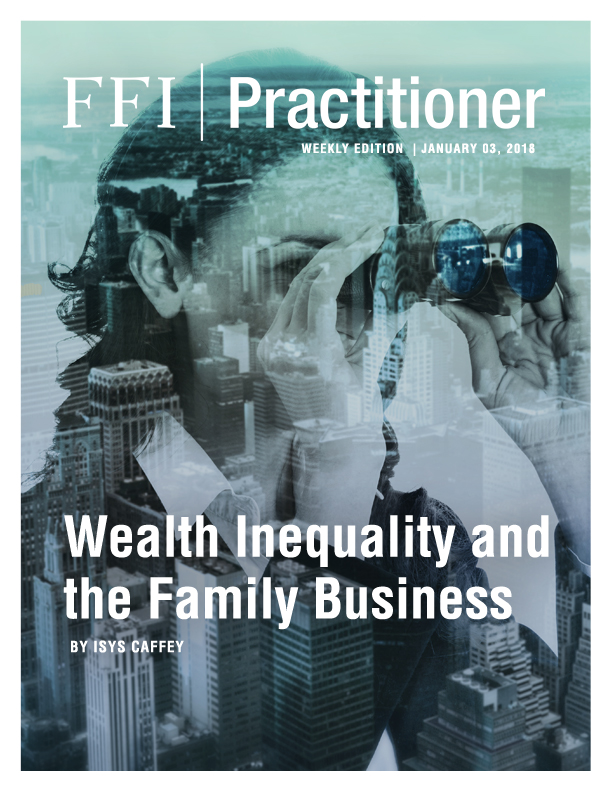Edition viewable on any device.

From FFI Practitioner
Thank you to this week’s contributor, Isys Caffey of Edelman, who launches 2018 with further analysis of the Edelman Trust Barometer Special Report: Family Business by focusing on the role that wealth inequality can play in public perceptions of family businesses and what family businesses can do to address these perceptions.
Introduction
In a previous issue of FFI Practitioner, we shared the results of the 2017 Edelman Trust Barometer Special Report: Family Business, which looks at trust drivers and perceptions of family business among more than 15,000 respondents across 12 countries. We found that while family business is more trusted than business in general, this trust advantage is tentative at best. Despite appreciation of and affinity for family-owned companies, the respondents reported that family business underperforms in several important areas when compared to nonfamily business, including philanthropy and leading on societal challenges.
The disconnect between performance and perception as it relates to philanthropy is both interesting and alarming. While academic research shows that family businesses are philanthropic and socially-minded, our study finds that persistent income inequality continues to cast a shadow of skepticism and mistrust on the wealthy. This skepticism can result in significant reputational and leadership challenges for family business leaders, especially those of the rising generation.
“While academic research shows that family businesses are philanthropic and socially-minded, our study finds that persistent income inequality continues to cast a shadow of skepticism and mistrust on the wealthy.”
Findings
Understanding our current economic and social environment helps bring clarity to the challenges facing family business leaders and the wealthy overall. The 2017 Edelman Trust Barometer revealed continued division between the mass population and those who are considered the informed public (a segment of the population that is higher-income, college-educated, and highly-informed on business and public policy matters.) The informed public trusts the institutions of government, business, media, and NGOs by 15 points more than the mass population. This trust gap is even starker in major economies such as the US (21 points), the UK (19 points) and France (18 points). Given these statistics, it is not surprising that more than half (53 percent) of global respondents say that “the system is broken.”
Against this backdrop, we sought to understand the impact of wealth on family businesses. The 2017 Edelman TRUST BAROMETER Special Report: Family Business found that there are significant expectations for how the wealthy leverage their largesse. This is not surprising, considering the study found that almost three in four people (74 percent) believe that the gap between the wealthy and everyone else has increased over the past 10 years. Seven in 10 say that wealthy individuals should create foundations or other vehicles to channel their wealth into society, and 66 percent agree that wealthy people are more obligated to work to improve society. There is also a sentiment that the wealthy should use their voices in addition to their wallets, as more than half (53 percent) believe that the wealthy have more of an obligation than the average person to speak out when they disagree with government policies.
Sidebar

The 2017 Edelman Trust Barometer showed that one of the drivers of the collapse in trust across all four key institutions — business, government, NGOs, and media — is an underlying “mass-class” conflict.
While expectations are high for wealthy individuals to use their means to create impact, these expectations are met with skepticism and cynicism. A majority of global respondents (78 percent) feel that wealthy people often create nonprofit foundations for negative reasons, including to assuage guilt, exert political influence, and for vanity and self-promotion. Further, 60 percent say that wealthy individuals don’t actually care about regular people and their problems.
In many cases, the next-generation leaders of family businesses bear the brunt of the suspicion placed on the wealthy. When compared to those who earned their wealth, inheritors of wealth are seen as less worthy of admiration. Only 40 percent of respondents believe that individuals who inherited their wealth deserve what they have, versus 66 percent who say the same for people who earned their wealth. Additionally, only 35 percent say that those who inherit their wealth are good role models, compared to 61 percent who say the same for those whose wealth was earned.
The perception of underserving and unimpressive heirs reveals reputational and leadership threats, as the study found that employees of family businesses see next-generation leaders as likely to mismanage the business (63 percent). Family business employees see next-gen leaders as less committed and passionate (56 percent), and all respondents agree that next-gen leaders are less impressive and talented (53 percent).
This skepticism and distrust doesn’t extend only to the performance of individual leaders, however, it also permeates into perceptions of family business as a social actor. The research found that only 17 percent of respondents believe that family business is more likely than nonfamily business to lead on societal challenges, and only 23 percent say the same for their participation in philanthropy and foundations. These findings are shocking, because in reality, 81 percent of the world’s largest family businesses practice philanthropy, and 56 percent of all family business owners personally oversee the progress and effectiveness of their philanthropic projects (“Staying Power: How do family businesses create lasting success?” EY and Kennesaw State University, 2016).
Implications
Some topics have always been taboo for family-business owners—wealth and the inner workings of the business are often top of that list. However, the plans and talents of the next generation, and the family’s and company’s approach to philanthropy, are no longer topics to be whispered about quietly. The value created through philanthropy and the credentials and qualifications of next-generation leaders are critical components of the family’s brand and enterprise that must be defined and discreetly shared with the right audiences.
The perception challenges brought to light by the 2017 Edelman Trust Barometer Special Report: Family Business are best addressed with discerning, well-rounded transparency. Family business leaders must engage in a challenging balancing act in which they communicate about the good they are doing without seeming self-serving. This is where a family business’ story and values can be both a trust builder and a differentiator. Seventy-one percent of respondents expect family business to be transparent about their philanthropy. Since 73 percent note that knowledge of the company’s history or founding story builds trust, a business-owning family should link its philanthropy to its heritage, showcasing how its philanthropy is an extension of the impact generated and values held by the family and business.
“The value created through philanthropy and the credentials and qualifications of next-generation leaders are critical components of the family’s brand and enterprise that must be defined and discreetly shared with the right audiences.”
Equally important as engaging around philanthropy is proving the merit of next generation leaders. Employees’ doubts should be addressed through thoughtful, sustained conversation. Respondents said that showing that the rising leader is committed to the future of the business (80 percent), experienced within the business (79 percent), and transparent about their plans for the business (78 percent) all can drive trust during a leadership transition. Ensure that the rising leader engages with employees, demonstrates commitment and has a professional persona that is both distinct and linked to the family heritage. All of these are critical to overcoming perceptional challenges related to inherited wealth.
In many cases, wealth is a double-edged sword. There are persistent expectations that the wealthy, especially wealthy family business leaders, contribute to society in more meaningful ways—but this expectation can be met with cynicism. Through strategic communications around the next generation and philanthropic efforts, members of business-owning families can better combat wealth-related suspicion and position themselves to be known for the immense business and societal value they create, rather than for the amounts of money they have inherited.

About the contributor
Isys Caffey is the global deputy lead for Edelman’s Global Family Business and Foundations offering and a vice president in the firm’s Atlanta corporate practice. Through the Family Business and Foundations offer, Isys works with some of the world’s leading family companies to build and protect their reputations and maintain trust to advance business objectives. She can be reached at Isys.Caffey@edelman.com.
About Edelman
Edelman is a sixty-four-year-old communications marketing firm that continues to push the boundaries of what PR can do. Grounded by core values and strengthened by its independence, the firm helps clients communicate, engage, and build relationships with their stakeholders.
Related Article
If you enjoyed this article, view the related article that addresses perception vs reality when it comes to trust and the family business.



